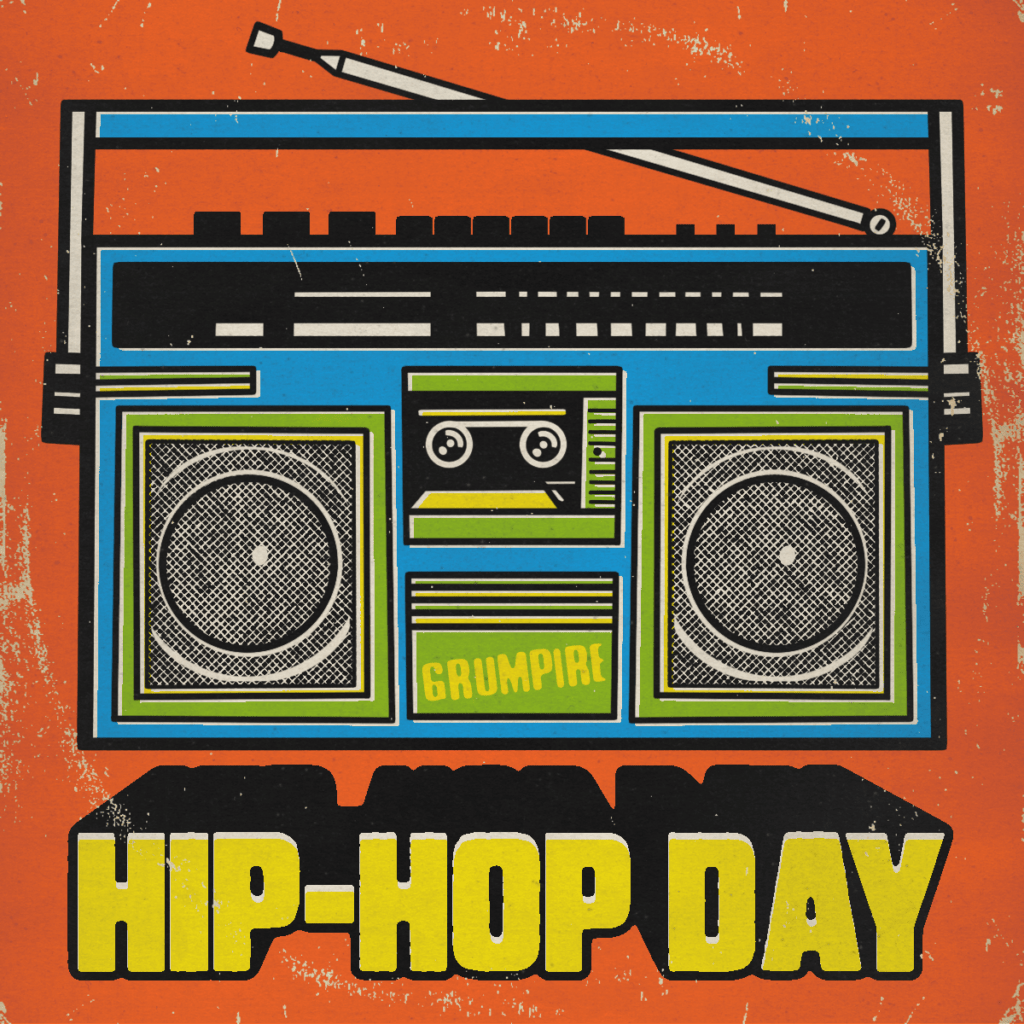Our second annual celebration of Hip-Hop Day comes just as a building block of hip-hop culture is globally recognized in the 2024 Paris Olympics! Very cool to see breaking added as an Olympic sport this year (more on that below). Also very cool to see these films on our 2024 Hip-Hop Day list receive the recognition they deserve.
FROM BRIAN MILLER:
CONFESSIONS OF A THUG (2005)
Thrift stores are filled with zero-budget gangsta life films on DVD. While often entertaining in general, these range from the tedious to the (sometimes intentionally) hilarious. While the same can be said of any B-movie subgenre, these films both occupy a place as folk art and reside in the same outsider economy that hip-hop was built on. So it is no surprise that many of these DVDs also revolve around the struggle of being a rapper. Confessions of a Thug takes another approach to explicitly being an example of the subgenre, though, by being a hip-hop musical. The protagonist acts as his own Greek chorus, rapping his way through the story of his fall and rise back to power. Not as a rapper, though; in his life, he is a dealer. He is just a rapper for us the viewers. No description of this film can avoid sounding like it is, at best, absurd. And it is. Yet, it works. The delivery is so earnest and unafraid of being silly that somehow it is not mockable. It is truly and simply cool, in the way that the coolest people aren’t trying super hard to be cool, they just are. This is genuinely a treasure among a giant world of films it could easily be confused with, making it transcend its budget and craft into one of the most “must-see” hip-hop films out there.
FROM ELBEE:
VOLCANO HIGH [MTV’S RAPPER DUB] (2003)
Thought by some to be a relic of lost media, it turns out this film is more of a relic of nostalgia. South Korea’s Volcano High (2001) is a supernatural anime-styled high school action film, both rich in tone and padded in runtime. MTV Productions thought it could use a bit of a re-edit however, and enlisted a cast full of hip-hop’s then-brightest stars to perform a truncated, not-so-rich, overdubbed version they could play on their channel. Similar to a routine anime overdub, the Korean actor’s voices are replaced by those of Andre 3000, Lil’ Jon, Snoop Dogg, Mya, Kelis, Big Boi, and Method Man. Recognizable voices can also be heard from Tracy Morgan and Pat Morita. Not only does MTV edit the language and runtime, some of the dialogue is changed enough for entire characters to play different roles within the same film. For instance, the Korean film has the actor Kwon Sang-woo portraying a young teacher named Song Hak-Rim; in MTV’s version, Snoop Dogg’s overdub changes the character to a well-respected student leader. But, most of the film remains intact, telling a story of delinquency, teenage romance, and kung fu. The supernatural elements have more to do with visions and magical powers than anything else, which is fine, especially when the plot turns toward that of the sci-fi punk cult classic Class of 1999 (1990) when the school administration employs a tough trio of teachers to keep the students in check. They’re mystically powerful, though, not robots.
Many online posts about this film are of the “I loved this film as a kid” variety with a slew of them excitedly mentioning they found a DVD copy in their local bargain bin. That fact pretty much puts a damper on the “lost media” label, especially since, if you really wanted to, you could snag a copy on eBay for about 20 bucks. Never fret, though ~ the best bet for watching this nostalgia piece comes from MTV themselves, which uploaded a decent-resolution version of the film on their Internet Archive page. Go ahead and download it, you don’t want to miss Andre muttering “Stank you very much” over a Korean actor’s lip movements after the film’s girl gang leader insults him.
BELLY (1998)
AGGRO DR1FT (2023)
It can only be speculated that Harmony Korine was so chuffed by Hype Williams including a clip from his 1997 indie Gummo in a scene in Belly that he decided to emulate Williams’ visceral visual style somewhere down the line. One might argue Korine did kind of repay the favor in Spring Breakers (2012), not in a direct reference, but in borrowing some of Williams’ technique: slow-motion montage set to a pop ballad, a heist scene swimming in backlights. But, it is Aggro Dr1ft that drenches itself in Williams’ style; both it and Belly present an almost incomprehensible narrative. In both cases, the protagonists’ narrations are wordy, sloppy, and difficult to discern. The audience is thrust into the stories and then expected to meditate in them, never mind how overwhelming they may be to the senses. Each film takes a period of adjustment, granted Korine’s is more of an adjustment due to the borderline gratuitous 100 percent use of a thermal camera effect, but after that adjustment, both films end up giving off a vibe similar to that of liminal horror. The audience doesn’t want to be involved, but they are. And they are watching. Belly is the easier to follow of the two, but only slightly. Plots are thin, acting isn’t great, scripts need definite work. Soundtracks, though? No notes. Hip-hop and electronica through and through. Williams never made another movie, only music videos and musician features, but maybe he should give it another go. As opaque as it is, Belly is a work of art. Some scenes are so painful or corny that they almost seem meaningless, but the whole thing is beautiful. Aggro Dr1ft is that times a thousand. All of this may make this sound like a bad review, but really there’s nothing to be mad about regarding these films. Plenty to dislike perhaps, but even then, it’s easy to appreciate their craft and flair.
from spencer seams:
FEAR OF A BLACK HAT (1993)
In 1993, hip-hop was having a banner year. Several releases from then became staples from Cypress Hill’s Black Sunday to Leaders of the New School’s final album, T.I.M.E., to The Coup’s Kill My Landlord, and even MC Lyte’s Ain’t No Other. Arguably the two biggest releases dropped on the same day: November 9, 1993, saw the official release of both Wu-Tang’s Enter the Wu-Tang (36 Chambers) and A Tribe Called Quest’s Midnight Marauders. That streak continued into the movies as well with Fly By Night and CB4, and another smaller movie called Fear of a Black Hat. I’ve been a hip-hop fan for years and never heard of this film until listening to an interview with film critic Sergio Mims (RIP, gone too soon). He played it at a festival as a palette cleanser to Goodbye Uncle Tom (1971). After that film, you would need a laugh.
This was the first feature by a young and upcoming Rusty Cundieff. Previously, he had directed the Neil Young & Crazy Horse video for “Mansion on a Hill” and acted in the Spike Lee joint, School Daze (1988), in the villainous Giancarlo Esposito frat. Also, Kasi Lemmons (director of Eve’s Bayou [1997] and actor in John Woo’s Hard Target [1993]) had a small part in School Daze as well and would show in Fear of a Black Hat. Cundieff’s rising career fully kicked off with this. Fear definitely helped show what he was capable of. Fear of a Black Hat is very directly a hip-hop variation on Spinal Tap (1984). Cundieff and producer Darin Scott are huge fans of Spinal Tap and wanted to make their own version after the 1990 2 Live Crew arrest for performing “As Nasty As I Want To Be.” This led to a short film and eventually Sundance ‘93. However, since CB4 was getting released soon that created a problem. That was another hip-hop mockumentary and had established names attached to it. Fear was bought but released over a year later without finding much of an audience initially. This would eventually happen as the years went on.
The mockumentary genre has become a staple for comedy, especially sitcoms. In 1993, this was not new but it was still novel. Cundieff and crew could take this format and do it cheaply and effectively. That’s really the vibe of the film. As much as I genuinely love this movie, it is adequate enough in key areas and excellent in others. The general look and aesthetic amounts to a cheap and/or convenient place to film. As funny as it is, some jokes repeat too much, and some jokes have aged like milk. The majority of the film consists of lots of city streets, hotel rooms, and small concert venues for the scenery. Nothing is spectacular but it helps with the sense of “NWH” (replace “Attitude” with “Hats”) in a real world. This lets the dialogue, deep love of hip-hop, and character work shine through. The music videos featured reflect the era and are direct parodies or references to real songs. It’s clear that’s where the majority of the budget went to. If someone who isn’t a hip-hop fan saw these, it’s not out of the question if they thought they were the real songs. NWH themselves can actually rap and write great parodies. Rusty Cundieff as Ice Cold, Mark Christopher Lawrence as Tone Def, and Larry B. Scott as Tasty Taste aren’t half-assing their way through the musical sequences. They can rap and pass as real rappers. On top of that, you don’t need to know all the references. The jokes and characters are strong enough that they overshadow the lesser elements. Fear of a Black Hat is a loving tribute to something that Rusty Cundieff and crew clearly love and respect. It’s palpable and shows a sillier sensibility to the ever-growing “grittification” happening at the moment. The cult of Fear of a Black Hat is still growing and still not enough people have heard the brilliant PM Dawn parody, “I’m Just A Human Being,” by Tone Def.
from jay alary:
6ix RISING (2018)
2024 will be remembered for a lot of things (including Canada’s Phil ‘Wizard’ Kim winning the inaugural Gold medal in the “Breaking” category at this year’s Paris Olympics), but one of the most peculiar-yet-enthralling events was the hip-hop beef between Kendrick Lamar and Drake. It’s safe to say Lamar defeated Drake handedly in the dizzying back-and-forth release of diss tracks, particularly with “Not Like Us”, which spilled out onto the international sports stage, with the USA men’s basketball team playing it after defeating Canada in an Olympics exhibition game. (Hey, I don’t think Canada is clamoring to embrace Drake’s general creepiness, even if he is a former Degrassi kid.) The hip-hop beef brouhaha reminded me of the documentary 6ix Rising, an engaging look at Toronto’s then quietly-growing hip-hop scene. Being the most diverse city in the world has many advantages, including fostering up-and-coming hip-hop artists, many of whom have achieved breakthrough success in the USA. (Just look up how many Toronto hip hop producers work with artists like Lamar and many other acclaimed and notable American rappers.) The documentary looks at the struggles and dreams of many emerging hip-hop artists trying to make it big, chasing after the success achieved by the Weeknd and yes, even Drake. Canada has come a very long way since the days of ‘90s white rapper Snow (which feels like a tired Canadian stereotype joke Kevin Smith would use in his mediocre movies) and it’s heartening to see such rapid progress made, even in 2018, foretelling the subsequent dominance of Toronto hip-hop culture on the international stage.
★★★

FROM ELBEE:
Breaking is an uniquely American art form. But what started in club battles in the Bronx over fifty years ago now stands as a measure of worldwide unity. Just like hip-hop itself, America brought the art of breakdance to the world, and the world accepted it. Not only that, but flourished in it. As we see in the films from the 1980s made to celebrate and illuminate early hip-hop culture, the stories truly reflect the scenes which spawned them. Diversity rules, with Black and Puerto Rican b-boys especially translating their life experiences to the screen, highlighting their talents as dancers, DJs, graffiti artists, and rappers. Films like Beat Street (1984), Breakin’ (1984), Breakin’ 2: Electric Boogaloo (1984), and Wild Style (1983) all show how people of all ethnicities and cultural backgrounds come together to unify themselves in one common goal: self-expression. Those young people were the champions of innovating a fresh new art form, one that proved its ability to endure the test of time.
Now, in 2024, breaking has achieved an amazing prize: the inclusion as a Summer Olympic game in Paris. For the first time in history, b-girls and b-boys will compete to take home a gold medal. The validation of which must be so gratifying to those who have seen the rise of hip-hop and hip-hop dance since those early days in the Bronx. Breaking is where art and athleticism intertwine, and it’s nice to see an Olympic Committee recognize that, even if this may be the first and last time (Breaking is not on the docket for the 2028 Olympics in Los Angeles). Having the world meet to show off their talents means so much: we are able to see how hip-hop is represented in other countries, how they put their own spin on its integration into their diverse cultures and make it their own. Breaking is about using skill and originality to win your battle, but it’s also about comradery. Competitors clown on each other, but in the end, the greatest battles turn into a big onstage hug-fest. And that’s due to the principles laid out in the roots of hip-hop culture; in the words of commentator B-Boy Ronnie at the 2024 Paris Olympics, breaking celebrates “peace, love, unity, and having fun.”
On this Hip-Hop Day, to honor this historic occasion, I’ve built this playlist which is a sampling of the songs put down by DJ Fleg (United States) and DJ Plash (Poland) for the Olympic breakers to Top Rock and Down Rock to. For the event, the organizers had to clear over 300 songs, and many of the choices are classics of competitive breaking. You’ll hear rap, Afrobeats, soul, jazz, funk, and some original DJ compositions ~ starting off with an undeniable staple of hip-hop culture, Snoop Dogg’s “Who Am I (What’s My Name)?”, which played as Snoop himself kicked off the Games performing the uniquely French ritual “les trois coups” with a baton. We here at Grumpire are extremely proud of this day and hope you are too.
Listen here on the Grumpire Spotify:
★★★
In 2023 we started this Hip-Hop Day tradition, the year of Hip-Hop’s 50th anniversary. Take a look back at our first installment of our favorite hip-hop films! And the playlist that went with it ★


